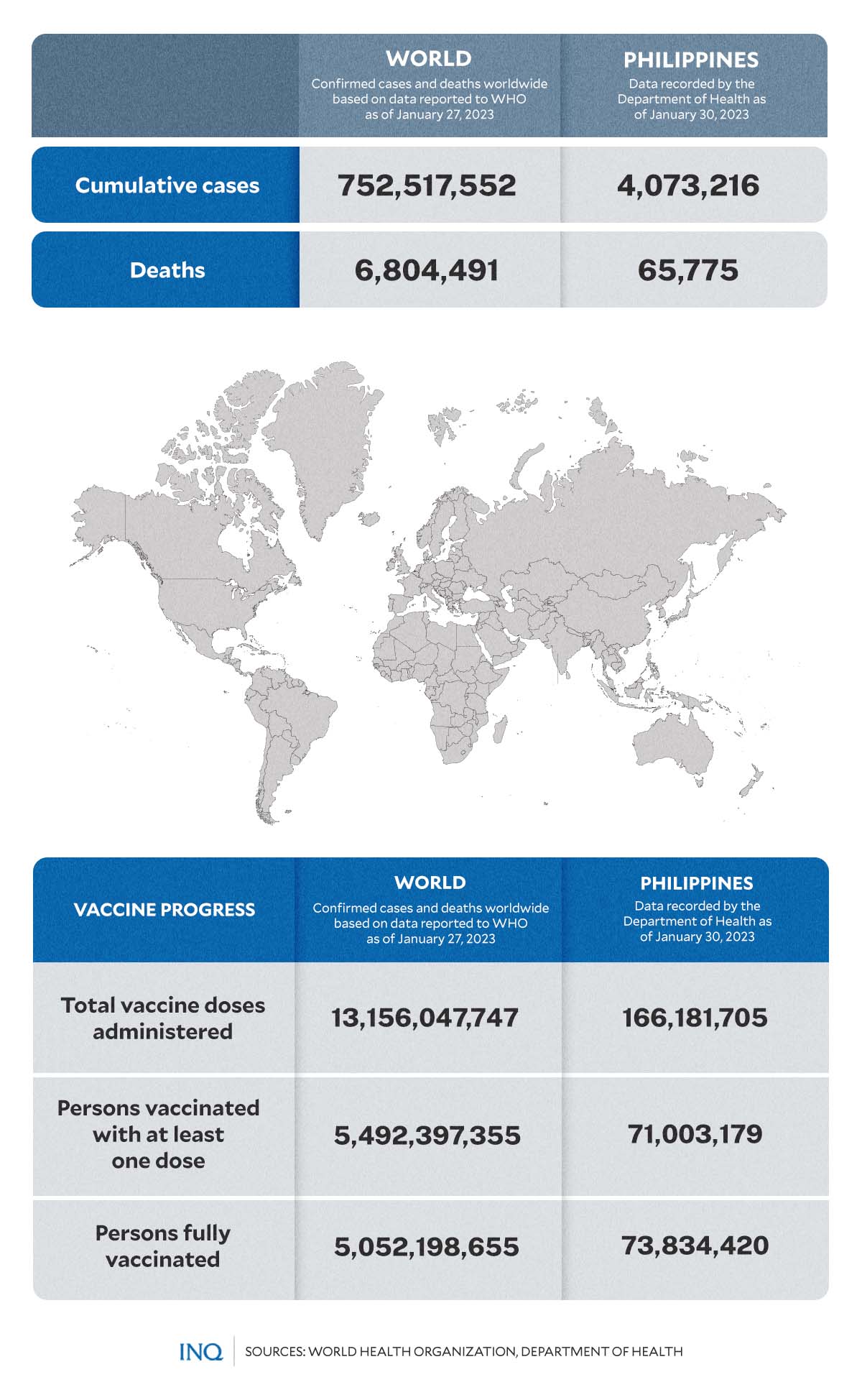Face masks, other measures still key as WHO keeps emergency tag on COVID

INQUIRER FILE PHOTOS/JEROME CRISTOBAL
MANILA, Philippines—The World Health Organization’s (WHO) verdict is in: The COVID-19 pandemic still presents a global health emergency.
Following the 14th meeting of WHO’s International Health Regulations Emergency Committee, WHO Director General Tedros Adhanom Ghebreyesus concurred with recommendations that the COVID-19 pandemic still constitutes a public health emergency of international concern (PHEIC).
The organization’s decision came three years after it first declared the disease as a PHEIC, noting that the COVID-19 pandemic “may be approaching an inflection point.”
“Achieving higher levels of population immunity globally, either through infection and/or vaccination, may limit the impact of SARS-CoV-2 on morbidity and mortality, but there is little doubt that this virus will remain a permanently established pathogen in humans and animals for the foreseeable future,” WHO said in a statement.

GRAPHIC Ed Lustan
“While eliminating this virus from human and animal reservoirs is highly unlikely, mitigation of its devastating impact on morbidity and mortality is achievable and should continue to be a prioritized goal,” it added.
COVID-19 is still dangerous
Although the United Nations (UN) agency acknowledged that the world is in a better position than it was at the peak of Omicron transmission a year ago, it stressed that over 170,000 COVID-19-related deaths had been reported globally in the last eight weeks.
Moreover, the global decline in surveillance and genetic sequencing has made it challenging to track known variants and detect new ones.
READ: Meet XBB.1.5, the new COVID subvariant that defies immunity, infects more efficiently
The WHO emergency committee, which has agreed that the COVID-19 pandemic remains a “dangerous infectious disease with the capacity to cause substantial damage to health and health systems,” also cited several other reasons the PHEIC declaration should stay.
Among these are health systems currently struggling with COVID-19 and caring for patients with influenza and respiratory syncytial virus (RSV) due to health workforce shortages and fatigued health workers.
It added that vaccines, therapeutics, and diagnostics have been and remain critical in preventing severe disease, saving lives, and taking the pressure off health systems and health workers globally.

GRAPHIC Ed Lustan
“Yet, the COVID-19 response remains hobbled in too many countries unable to provide these tools to the populations most in need, older people and health workers,” it continued.
Globally, as of January 27, there have been 52,517,552 confirmed cases of COVID-19, including 6,804,491 deaths, reported to WHO.
In the Philippines, the Department of Health (DOH) recorded a total of 4,073,216 COVID-19 cases nationwide. Of these, 65,775 were marked as deaths, while 3,997,489 were labeled as recovered.
In terms of vaccine progress, data reported to WHO showed that a total of 13.1 billion vaccine doses have already been administered globally as of January 23. Across the globe, there are 5,492,397,355 individuals vaccinated with at least one dose and 5,052,198,655 fully vaccinated persons.
As of January 29, data from the National COVID-19 Vaccination Dashboard showed that 166,181,705 vaccine doses have been administered in the Philippines. At least 71 million have received a single dose, while nearly 74 million are fully vaccinated against COVID-19.
WHO COVID recommendations
Amid the still increasing cases of COVID-19 globally and the emerging new SARS-CoV-2 variants and sub-variants, WHO urged countries to remain vigilant and to recommend appropriately targeted risk-based public health and social measures (PHSM) where necessary.
In an updated interim clinical management of the COVID-19 pandemic released earlier this month, WHO reiterated its recommendation to use face masks as a vital tool against COVID-19.
The agency reminded the public to continue wearing face masks in specific situations, “irrespective of the local epidemiological situation,” given the current spread of COVID-19 globally.
READ: WHO revises COVID guidelines: What to know
Upon WHO’s announcement on maintaining COVID-19’s PHEIC status, Ghebreyesus also listed a set of temporary recommendations that could help countries across the globe manage the dangerous infectious disease.
The WHO director-general’s recommendations include:
- Focus on vaccination and boosters against COVID-19, specifically maintaining momentum for COVID-19 vaccination to achieve 100 percent coverage on high-priority groups.
- Improve reporting of SARS-CoV-2 surveillance data to WHO. Better data are required to detect, assess, and monitor emerging variants
- Identify significant changes to COVID-19 epidemiology and understand the burden of COVID-19 in all regions.
- Increase uptake and long-term availability of COVID-19 vaccines, diagnostics, and therapeutics.
- Maintain strong national response capacity and prepare for future events.
- Continue working with communities to address COVID-19-related a pandemic in misinformation and to implement risk-based PHSM effectively.
- Continue to adjust any remaining international travel-related measures based on risk assessment.
- Continue to support research for improved vaccines and post-COVID-19 condition.
TSB
RELATED STORY: As world in the dark on China’s COVID nightmare, PH weighs options on arrival
For more news about the novel coronavirus click here.
What you need to know about Coronavirus.
For more information on COVID-19, call the DOH Hotline: (02) 86517800 local 1149/1150.
The Inquirer Foundation supports our healthcare frontliners and is still accepting cash donations to be deposited at Banco de Oro (BDO) current account #007960018860 or donate through PayMaya using this link.